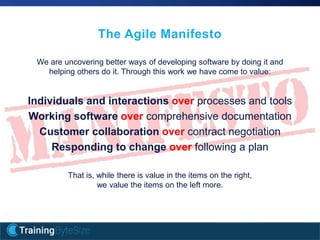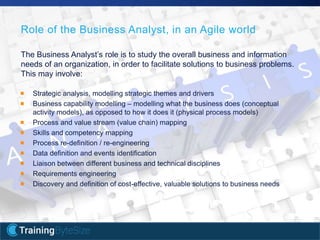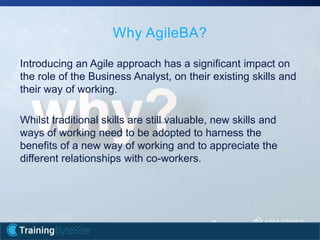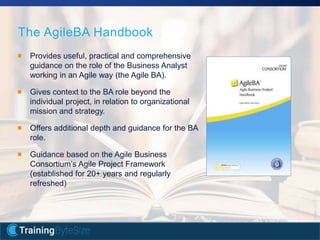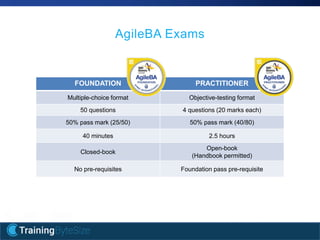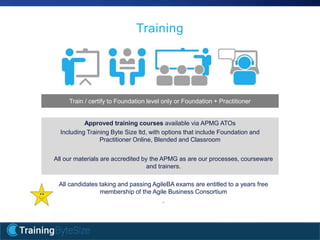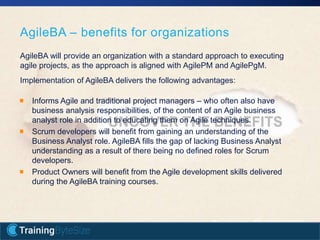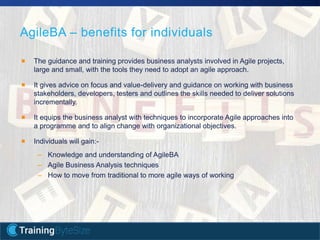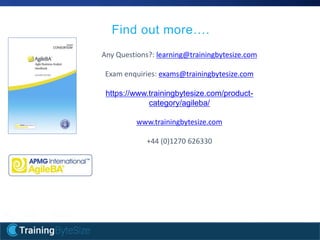AgileBA introduction and certification options
- 1. 1apmg-international.com The Agile BA certification was created in partnership with the Agile Business Consortium, the professional body for promoting and enabling business agility worldwide. Introduction to AgileBA® Certification
- 2. 2apmg-international.com Develop the skills needed to become a proficient Agile Business Analyst. Foundation and Practitioner level certification available.
- 3. 3apmg-international.com AgileBA® (Agile Business Analysis) AgileBA Handbook Official guidance Published by Agile Business Consortium Approved Training Training Byte Size Ltd (online, blended and classroom) Accredited by APMG to offer approved training services Certification Foundation + Practitioner Syllabus & exams developed by APMG
- 4. 4apmg-international.com Developed in partnership with the Agile Business Consortium – the leading not-for-profit professional body for promoting and enabling business agility worldwide. www.agilebusiness.org The Agile Business Consortium created the AgileBA Handbook and partners with APMG to develop the supporting accredited training and certification program.
- 5. 5apmg-international.com The Agile Manifesto We are uncovering better ways of developing software by doing it and helping others do it. Through this work we have come to value: Individuals and interactions over processes and tools Working software over comprehensive documentation Customer collaboration over contract negotiation Responding to change over following a plan That is, while there is value in the items on the right, we value the items on the left more.
- 6. 6apmg-international.com Background Agile’s influence on the project management industry continues to rise at pace. Increasing numbers of organisations and project professionals are embracing Agile tools and frameworks as they aim to increase the success of – and return on investment from – projects, product / software development and other change initiatives. Despite originating in the software development arena, Agile methods and frameworks are becoming increasingly popular in a wide variety of industries and projects as the benefits over more traditional frameworks and methodologies are realised. As organizations and individuals embrace and transition to Agile ways of working, the roles of key personnel can evolve significantly, requiring fresh guidance, concepts and techniques. Prior to AgileBA, there was little in the way of detailed guidance directly addressing the role, responsibilities and skills of the Agile Business Analyst.
- 7. 7apmg-international.com Role of the Business Analyst, in an Agile world The Business Analyst’s role is to study the overall business and information needs of an organization, in order to facilitate solutions to business problems. This may involve: Strategic analysis, modelling strategic themes and drivers Business capability modelling – modelling what the business does (conceptual activity models), as opposed to how it does it (physical process models) Process and value stream (value chain) mapping Skills and competency mapping Process re-definition / re-engineering Data definition and events identification Liaison between different business and technical disciplines Requirements engineering Discovery and definition of cost-effective, valuable solutions to business needs
- 8. 8apmg-international.com Business analysis operates from the top level of the organization, dealing with the Vision, Mission, Objectives and Strategy, right through to the tactical level where programmes of work are set up to address strategy and where solution development projects often reside. At the higher level, the Business Analyst is a business architect, defining and modelling what the business will do strategically. High- level organizational models allow robust and coherent business architecture to be defined, with clear objectives and measures. This will then support tactical decisions of how the objectives are to be achieved at programme and project level. Role of the Business Analyst, in an Agile world
- 9. 9apmg-international.com Introducing an Agile approach has a significant impact on the role of the Business Analyst, on their existing skills and their way of working. Whilst traditional skills are still valuable, new skills and ways of working need to be adopted to harness the benefits of a new way of working and to appreciate the different relationships with co-workers. Why AgileBA?
- 10. 10apmg-international.com Why AgileBA? There is a growing body of evidence that an Agile approach is an effective way of working in projects. Key features: The collaborative working and involvement of people with the right skills, including those of the customer and end-users of the product we are producing An incremental approach, delivering value early and regularly The acceptance that we cannot know all of the detail at the outset, and that we will inevitably learn more as work progresses The definition of fine detail only just before we need it, to avoid the waste of trying to predict the detail too early The empowerment of people at the right levels, to make decisions on detail.
- 11. 11apmg-international.com The AgileBA Handbook Provides useful, practical and comprehensive guidance on the role of the Business Analyst working in an Agile way (the Agile BA). Gives context to the BA role beyond the individual project, in relation to organizational mission and strategy. Offers additional depth and guidance for the BA role. Guidance based on the Agile Business Consortium’s Agile Project Framework (established for 20+ years and regularly refreshed)
- 12. 12apmg-international.com What’s in the Handbook? The Role of the Business Analyst, in an Agile World Agile Fundamentals and the Agile BA The Agile Business Case Stakeholders in the Agile Project Requirements and User Stories Prioritisation Workshops Modelling Timeboxing and Iterative Development Requirements Planning and Estimating Throughout the Lifecycle The Requirements Lifecycle in an Agile Project Making the Transition to Agile BA APPENDICES A: Glossary B: Modelling Techniques C: Project Approach Questionnaire (PAQ) D: Facilitated Workshops E & F: Bibliography & Index CHAPTERS
- 13. 13apmg-international.com AgileBA training and certification
- 14. 14apmg-international.com AgileBA certification – the syllabus Four key areas:- – Business Analysis Fundamentals – Strategy and Organisation – Practices – Requirements
- 15. 15apmg-international.com AgileBA Exams FOUNDATION PRACTITIONER Multiple-choice format Objective-testing format 50 questions 4 questions (20 marks each) 50% pass mark (25/50) 50% pass mark (40/80) 40 minutes 2.5 hours Closed-book Open-book (Handbook permitted) No pre-requisites Foundation pass pre-requisite
- 16. 16apmg-international.com Training Approved training courses available via APMG ATOs Including Training Byte Size ltd, with options that include Foundation and Practitioner Online, Blended and Classroom All our materials are accredited by the APMG as are our processes, courseware and trainers. All candidates taking and passing AgileBA exams are entitled to a years free membership of the Agile Business Consortium . Train / certify to Foundation level only or Foundation + Practitioner
- 17. 17apmg-international.com AgileBA target audience Practicing and aspiring Business Analysts operating in an Agile environment Practicing and aspiring Business Analysts operating in a traditional environment looking to migrate to Agile Agile team members with BA responsibilities
- 18. 18apmg-international.com AgileBA – benefits for organizations Informs Agile and traditional project managers – who often also have business analysis responsibilities, of the content of an Agile business analyst role in addition to educating them on Agile techniques. Scrum developers will benefit from gaining an understanding of the Business Analyst role. AgileBA fills the gap of lacking Business Analyst understanding as a result of there being no defined roles for Scrum developers. Product Owners will benefit from the Agile development skills delivered during the AgileBA training courses. AgileBA will provide an organization with a standard approach to executing agile projects, as the approach is aligned with AgilePM and AgilePgM. Implementation of AgileBA delivers the following advantages:
- 19. 19apmg-international.com The guidance and training provides business analysts involved in Agile projects, large and small, with the tools they need to adopt an agile approach. It gives advice on focus and value-delivery and guidance on working with business stakeholders, developers, testers and outlines the skills needed to deliver solutions incrementally. It equips the business analyst with techniques to incorporate Agile approaches into a programme and to align change with organizational objectives. Individuals will gain:- – Knowledge and understanding of AgileBA – Agile Business Analysis techniques – How to move from traditional to more agile ways of working AgileBA – benefits for individuals
- 21. 21apmg-international.com Find out more…. Any Questions?: learning@trainingbytesize.com Exam enquiries: exams@trainingbytesize.com https://www.trainingbytesize.com/product- category/agileba/ www.trainingbytesize.com +44 (0)1270 626330




